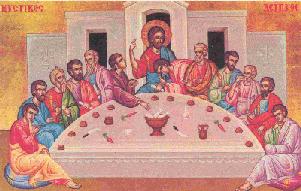


EUCHARIST:
THEOLOGY
& CELEBRATION
![]()
Course Description
The Church makes the Eucharist and the Eucharist makes the Church.
A biblical, historical, systematic and liturgical treatment of the
Eucharistic liturgy
with a special emphasis on pastoral considerations.
![]()
Goals of the Course
The goal of this course is a comprehensive understanding of the
nature
and development of the Christian Eucharist.
In order to accomplish this end an examination of both the structure
and the content of the eucharistic liturgy will be undertaken.
A positive theological method will be employed whereby the Eucharist
will be studied from an historical perspective,
after which a systematic theological reflection upon various aspects
will be undertaken with a commentary on contemporary theory and
practice.
![]()
Books required for the course
1. Robert Cabié, The Eucharist (A. G. Martimort, ed., The Church at Prayer, vol. 2) (Collegeville: The Liturgical Press, 1986).
2. Jerome Kodell, The Eucharist in the New Testament (Collegeville: Glazier, 1991).
3. R. C. D. Jasper and G. J. Cuming, Prayers of the Eucharist: Early and Reformed (Collegeville: Liturgical Press, 1987).
4. R. Kevin Seasoltz, Living Bread, Saving Cup (Collegeville: Liturgical Press, 1982).
![]()
Implementation
1. Since this class will meet only twice weekly, attendance is imperative. If for any legitimate reason, you are unable to attend class, by way of academic courtesy please let me know prior to the class meeting, either personally or by telephone or email.
2. For each class day there will be assigned reading averaging fifty pages per day. The readings should be completed prior to each class. Additional suggested readings are provided in a separate bibliography.
3. Two brief reports of about five to eight pages each will be assigned. See Course Calendar for due dates. Projects are found in course packet and topics will be discussed in class.
4. It will be fair to assume that any obligatory assigned reading is subject to unannounced quizzes.
5. There will be a mid-term and a final exam that may be taken either in a written or oral fashion.
6. The grade will be determined by three equally weighted
considerations:
a. attendance, quality of class participation, quizzes,
b. two brief reports and
c. the mid-term and final exams.
![]()